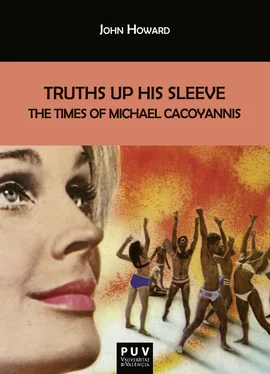After an arduous five-day journey over land and sea from Limassol to London—via Port Said, Valletta, Marseille, Calais, and Dover—Michael arrived in 1938 at Victoria station, where big sister Stella welcomed him. A top graduate of English Girls’ College in Egypt, Stella then had enrolled at St. James’s Secretarial College behind Buckingham Palace. With bishops, deans, lords, and ladies among their patrons, St. James’s promised potential employers a “lady secretary who is really efficient, intelligent, and of good birth.” With the help of his birth, his father’s connections, and his outstanding high school record, Michael had won a place to study law at Gray’s Inn, one of central London’s four great Inns of Court. So Michael would move in to the same five-floor west London boardinghouse where Stella lived. Not entirely sex-segregated, it catered to “old ladies and students.” But first things first, Michael forgot his fatigue and disregarded his aching back. (Before jetlag, long-distance travelers suffered railway spine.) He insisted he check his bags at the station, so he and Stella could go at once to the West End theatre district. On his very first night in London, the two teenagers would see a play. 2
Michael knew all about it, perhaps already had read the script. Esteemed for his bold early plays such as Mixed Marriage , St. John Ervine had written his latest for—and dedicated it to—his starring actors Edith Evans and Owen Nares. Michael had watched Nares on the silver screen, and he followed the glowing reviews that made Evans England’s premiere leading lady. Although thanks to his mother Michael had attended many playhouse performances in Cyprus, including those of Greek traveling companies, tonight would be his first live performance of a major West End production. In many other respects, it was a first. 3
Set in a priest’s home in present-day southern England, Robert’s Wife is a well-made comedy about the looming Second World War, as well as home front culture wars over the emancipation of women. Less than ten years after British suffragettes achieved an equal right to vote, pastor Robert’s second wife Sanchia is a dedicated physician determined to expand her clinic. Since Robert might be elevated to dean or bishop, the plot asks: Whose career comes first? Up in the cheap seats, secretarial student Stella must have marveled at the very premise. Further comparing clerics and medics irrespective of gender, the play asks: Is tending souls more important than healing bodies? Not if there’s no afterlife, the play answers. Indeed, Sanchia declares she’s “not a Christian,” her parents agnostics. She toys with other “queer” ideas such as rational atheistic altruism. Also, since Sanchia advocates birth control for women, another priest declares war on her medical practice. Already drawn to secular humanism, Michael would have identified with Sanchia’s outrage against pious reactionaries who thwart her good works. 4
About Michael’s age, Robert’s son also is a radical. An Oxford student, pacifist, and communist who champions conscientious objection to war, he is jailed for sedition, declining appeals. Though he remains in jail on principle, the play nonetheless ends happily, as a heretofore minor character steps forward to resolve the central conflict between husband’s church and wife’s science. How? With a stunning set of revelations in the play’s final scene. “Not the marrying sort”—truly, a woman “like that”—39-year-old Miss Orley confesses that she is in love with Robert. The play hints that she’s also in love with Sanchia. So much so that she makes a large donation that saves Sanchia’s clinic and Robert’s promotion. The play closes with a riddle about appearances versus actuality, as Sanchia and Robert delight in “a very strange thought.” 5
This evening of queer ideas and strange thoughts left Michael exhilarated, never more enamored of the theatre. In addition to acclaimed performances by Evans and Nares, Michael admired Ervine’s famed technical mastery and his allusions to classical Greek drama, notably Aristophanes’ Lysistrata . Speaking at an antiwar rally, Robert’s son proposes “a strike against motherhood. Every woman is to refuse to have more babies until armaments have been abolished.” Stella too was impressed by the evening’s entertainment, a purported comedy confronting society’s thorniest subject matter. Whatever the effect of the audience on Stella, looking down on London’s glitterati and intelligentsia, she too was spellbound by Edith Evans and her extraordinary character, who charts her unique path within and against the very house of belief, Robert’s vicarage. Doubtless named after the Queen of the Romans, Sanchia demonstrated most for Stella that educated twentieth century women could aspire to much more than secretarial work. Might this be an omen? Might Sanchia be a role model? 6
More so, the evening for Michael foretold a rich world of abstract thinking and political possibility enacted onstage and on the streets of London. Already he had imbibed this world via film and fan magazines, back in Limassol. Now he had the chance to sample it and live it. In fact, from the late 1930s to mid-1940s, Michael carved out unprecedented freedoms for himself, as he lived away from home, away from Cyprus, for the first time in his life. Gregarious and outgoing, he cultivated new friendships and collegial relationships without difficulty, as his career took exciting unexpected turns. However, between the mid-1940s and early 1950s, all three of Michael’s siblings would come to London for extended residencies, often living with him or near him. Michael would grow ambivalent, torn between his rapidly expanding circle of associates and his family of origin. While friends continued to offer him new ways of life and work, family all too frequently impeded them. Before, during, and after World War II, London opened countless opportunities for Michael to explore gender and sexuality, not only personally but also professionally, as a consistent thematic concern in his writing. Though Stella too would find liberating possibilities in London, Michael’s siblings in the main represented stifling heteronormativity, as one after another got married and as their parents questioned them over and over about grandchildren. Not the marrying sort, Michael took advantage of London’s vast prospects to find the right occupation and, on occasion, real happiness.
The Law and Its Discontents
Though they had competed ruthlessly for their mother’s love and attention— their father forever at the office or away—Michael loved Stella and admired her. Their time together in London in the late 1930s influenced both a great deal. They conversed nonstop about the myriad attractions of Europe’s largest city, and they discovered many of those attractions together. Their boardinghouse at 140 Lexham Gardens was situated closer to Earl’s Court station than High Street Kensington. Still Michael referred to their neighborhood as toney Kensington, one of many such harmless affectations among small-town upward-striving folks transplanted to the city. Most mornings, Michael accompanied Stella to Earl’s Court and together they rode the Piccadilly line to Hyde Park Corner, where Stella would get off and walk four blocks to her college on Grosvenor Place. Michael stayed on the train until Holborn, then walked to Gray’s Inn, or changed trains in bad weather to ride one more stop to Chancery Lane. Though Michael resented his “tyrant” of a father for forcing him to study law, Gray’s Inn would serve him well, in ways not yet apparent to him. 7
In his application to Gray’s Inn, Michael overstated his age. Though seventeen in late 1938, he claimed to be eighteen. Though the admissions committee considered well-educated well-recommended candidates of any age, Michael knew that after securing the degree and passing qualifying exams, he could be called to the bar only at age twenty-one or over. Already he hoped to finish in record time, and be done with it. But the War and the Blitz intervened. 8
Читать дальше











